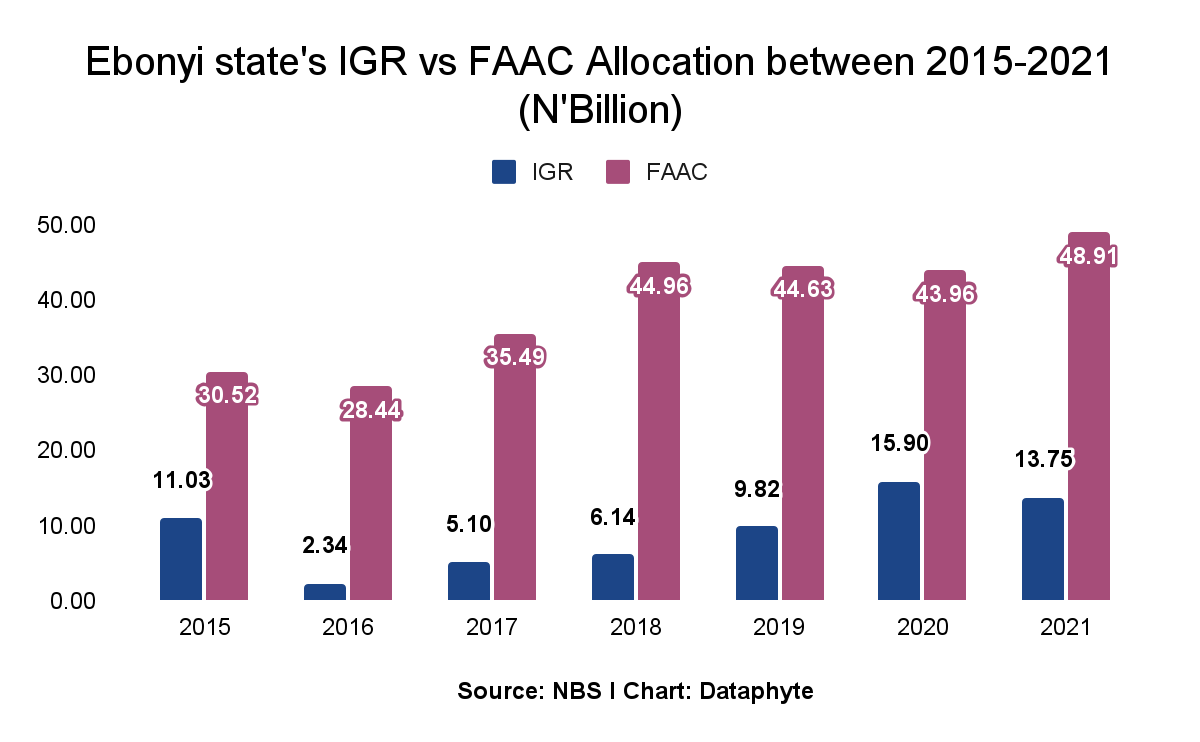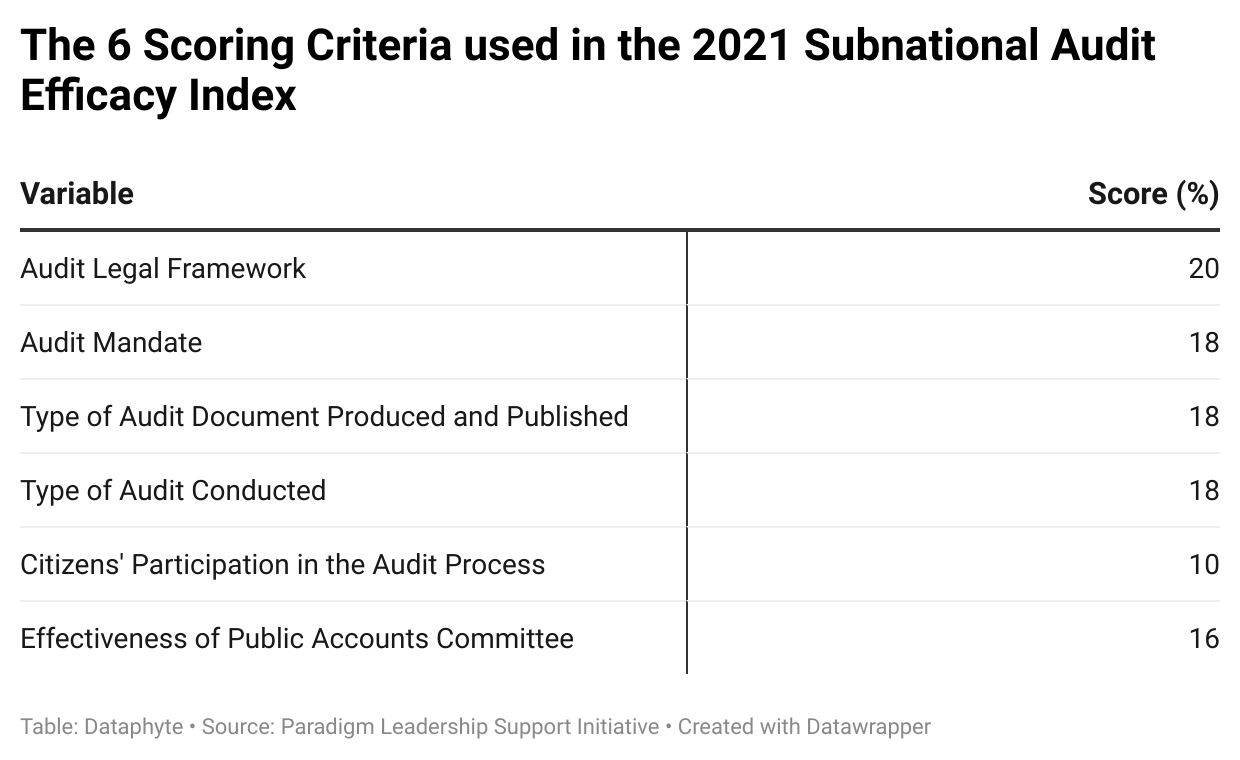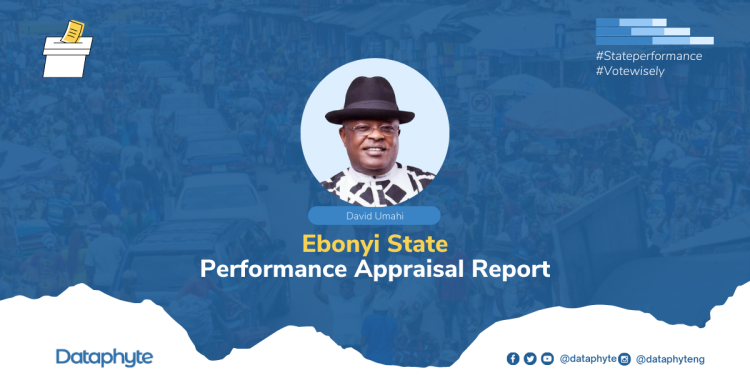If David Umahi wins the Ebonyi South senatorial seat in 2023, he will join the list of Ex-Governors in Nigeria who have become “Distinguished Senators.”
David Umahi, fondly called Dave, was first elected as the Governor of Ebonyi state in 2015 under the platform of the Peoples Democratic Party (PDP). Before his election in 2015, he served as the state’s Deputy Governor under the PDP. However, on November 17, 2020, he formally defected to the All Progressives Congress (APC) and would complete his second term in office as a member of the APC.
Like many of his counterparts in other states, he is on the ballot in the 2023 election, contesting to represent the people of Ebonyi South in the upper chamber of the National Assembly. There is, therefore, no better time than now to assess the performance of Umahi across certain socioeconomic indicators and how Ebonyi state fared under his leadership as the state’s chief executive officer. Likewise, it highlights important areas to which the state governorship candidates in the 2023 race may need to give attention to accomplish development in the state.
GDP, IGR & Fiscal Strength
GDP
The Gross Domestic Product (GDP)gives information about the size of a state’s economy and how the economy is performing.
According to data released by the National Bureau of Statistics (NBS) in 2012, Ebonyi state had an estimated GDP of $2.848 billion. It ranked 3rd among the 36 states in Nigeria with the lowest GDP.
Since Umahi came into office in 2015, no subnational GDP report has been released by the NBS. As such, we may not be able to give the accurate GDP growth rate recorded by his administration. However, the 2022 State of States report by BudgIT puts the current GDP of the state at N2.24 trillion. With this, the state ranks 2nd in the South-East with the lowest GDP and 12th nationally.
IGR
Also crucial in any development assessment is the internal revenue performance of Ebonyi state under the Umahi-led administration. A state’s IGR reveals its financial stability and capacity to support long-term economic activity, such as boosting employment and providing high-quality public services. It also demonstrates the state’s capacity for independent operation without excessive reliance on monthly allocation from the federation account.
In 2015, Ebonyi generated a total IGR of N11.03 billion. The following year, the state’s IGR dropped by 78.77 per cent to N2.34 billion and was the state with the lowest IGR in the country.
Between 2015 to 2019, the state saw an annual growth in its IGR. However, none of the revenue generated within this period was up to its 2015 record of N11.03 billion.

Surprisingly, Ebonyi state generated its highest IGR in 2020, despite the financial storm caused by the coronavirus (COVID-19), which affected the IGR of many states in Nigeria. The positive growth the state recorded in 2020 was primarily attributed to the government’s policy on IGR collection and payments in the state.
However, in 2021, the state could not maintain the record it set the previous year as data shows that its IGR dropped by 13.49 per cent to N13.75 billion, and was ranked as the 11th state with the lowest IGR and second lowest among the South-Eastern states.
On a per capita basis, Ebonyi state has the second lowest among its peers in the South East. The state’s IGR per capita of 4,151 is lower than the national average of N7,944.
While the state recorded positive growth in its IGR in most parts of the period under review, particularly between 2017 and 2020, it is evident that its IGR is still relatively small. Therefore, whoever emerges as the state’s next governor will need to double efforts to increase its internal revenue and, more importantly, reduce its high dependence on federally allocated funds.
In the period under review, Ebonyi generated only N64.09 billion as its internal revenue. On the other hand, it received a total of N276.91 billion as FAAC disbursement. This means that out of the state’s income of N341 billion (i.e., its IGR plus FAAC between 2015-2021), its IGR accounted for only 18.80 per cent, while FAAC disbursement made up 81.20 per cent, indicating the state’s heavy dependence on federally allocated funds for survival.
The state’s heavy dependence on FAAC allocations is particularly concerning, especially now that the Nigerian National Petroleum Company (NNPC) Limited has recently failed to remit funds into the federation account, which is already hitting hard on many states in Nigeria. Plans to explore the various revenue options in the state to reduce its heavy dependence on FAAC should therefore form a critical part of the agenda of the governorship candidates.
FISCAL SUSTAINABILITY
In October 2022, BudgIT assessed the fiscal sustainability of the 36 states in Nigeria using four indexes. These include; the ability of a state to cover its operating costs with only its IGR, its ability to cover all its operating expenses and loan repayment obligations without resorting to borrowing, its debt sustainability and the prioritisation of capital over recurrent expenditures.
Ebonyi State emerged in the 5th position in the 2022 ranking, a drop from its 2nd place in 2021. However, the 2022 performance is an improvement from its 6th position in 2020 and 13th in 2019.
It is worth noting that in the 2022 and 2021 rankings, Ebonyi state was the best-performing state in the South East in terms of financial sustainability.
Also worth highlighting under the fiscal sustainability of the state is the domestic and foreign debt obligations.
In December 2015, Ebonyi state had a total domestic debt of N34.17 billion, while its foreign debt was $47.17 million. In 2016, the state reduced its domestic and foreign debt by 17.89 per cent and 1.66 per cent, respectively.
-1709761931.png)
In 2017 and 2018, Ebonyi state’s domestic debt increased annually. However, from 2019, the state started reducing its domestic debts, coming down to N42.16 billion at the end of 2021.
However, it was the opposite with its foreign debt. The state collected foreign loans every year between 2017 and 2020. The state’s foreign debt only dropped marginally in 2021.
With $63.47 million, Ebonyi was the 19th most indebted state in Nigeria with respect to foreign debt. It, however, has the least foreign obligation among the five South-East states.
On domestic debt, the state is the second least indebted state among the 36 states of the federation.
Although Ebonyi state appears to have a solid debt sustainability profile according to BudgIT, whoever emerges as the state’s next governor would still need to be mindful of borrowing so as not to cross the solvency thresholds established by the Debt Management Office (DMO).
Unemployment rate
One of the visions Umahi outlined for Ebonyi state in his manifesto is to make the state a land that brims with employment opportunities for the youths of the state.
A year after he was sworn in as the governor of Ebonyi state in 2015, Umahi stated that his administration would fulfil all its campaign promises to the people of the state within three years in office. These campaign promises also included creating jobs for the people of Ebonyi state.
In 2019, Umahi boasted that he would make Ebonyi state a model to other states of the federation on job creation and infrastructure development.
Well, the labour force statistics from NBS indicate the contrary. According to the data, the unemployment rate in the state doubled between 2017 and 2020.
-1709761962.png)
With a 2020 unemployment rate of 40.80 per cent (i.e., those in the labour force who did nothing at all plus those who worked less than 20 hours in a week), it means that at least 4 out of every 10 Ebonyians are unemployed. This is a high increase compared to what it was in 2017 and 2018. Therefore, plans to address the increasing unemployment rate in the state should be a priority for the governorship candidates in the upcoming election.
Poverty Rate
Using the state’s IGR, particularly from 2017, Ebonyi appears to have recorded positive economic growth. However, the poverty rate remains very high.
In 2019, NBS used an actual per capita expenditure of N137,430 per year (or N376.50 per day) to measure the poverty rate in Nigeria. According to the data, Ebonyi state had a poverty headcount of 79.76 per cent — ranking as the 4th state with the highest poverty rate in Nigeria. The state was the poverty capital of Southern Nigeria, as it had the highest poverty rate among the 19 southern states in Nigeria in 2019.
Although the state no longer holds the infamous title as the poverty capital of Southern Nigeria due to a slight drop in its poverty rate in the latest National Multidimensional Poverty Index (MPI) report released by NBS, its poverty rate is still high. It ranks among the top 10 states in Nigeria, with the highest share of its population living in multidimensional poverty.
The 2022 MPI report by NBS measured the poverty rate on three broad indexes — health, education, and living standards. According to the report, 78 per cent of the population of Ebonyi is multidimensionally poor. This means that at least 7 out of every ten persons in the state are living in multidimensional poverty. This is the highest rate in the South-East and second highest among the 19 states in the Southern part of the country.
Dealing with the high poverty rate and presenting a roadmap to reduce it significantly should be a top agenda for the governorship candidates, particularly the person who emerges as the state’s next governor.
Number of Out-of-School Children
The most recent data on the number of out-of-school children in Nigeria by NBS was in 2018. According to data, an estimated 10.19 million children (5-14 years) are out of school in Nigeria. Ebonyi state housed 145,373 and ranked as the second state with the highest number of out-of-school children in the South-East.
Before beginning his second term in office in 2019, Umahi announced that his administration was taking measures to ensure no out-of-school children from the state. His goal was to accomplish this in six months.
While there’s no new data on the number of out-of-school children in Nigeria to enable us to ascertain if Umahi kept to his promise of ensuring that Ebonyi state does not have any out-of-school children again, the available data shows that the state has work to do on this indicator. Moreover, the United Nations Educational, Scientific and Cultural Organisation (UNESCO) disclosed in September that the number of out-of-school children in Nigeria has risen to 20 million.
With this increase, Ebonyi may likely experience a corresponding increase in its number of out-of-school children. As such, the governorship candidates should prioritise in their manifestos the improvement of access to education in the state.
Ease of Doing Business Ranking
A conducive business environment plays a crucial role in attracting investments to a state. It is one of the primary factors investors consider before choosing an investment destination. David Umahi recognised this, and at different times he reiterated his commitment to providing a conducive business environment in Ebonyi state to attract investors and ensure businesses thrive.
For instance, in 2020, Umahi introduced a tax relief that exempted mainly traders and others in the state from paying taxes. Equally, in 2021, the state passed the Revenue Law to make it easy to do business in the state.
There is no data to assess the business environment in Ebonyi state before the Umahi administration; however, the ease of doing business report published by the Presidential Enabling Business Environment Council (PEBEC) in 2021 ranked Ebonyi 23rd out of the 36 states and Federal Capital Territory (FCT). The state scored 5.20 out of a total index score of 10, making it the third state in the South-East with the most favourable business environment.
The PEBEC ranking was on four thematic areas — Infrastructure and Security, Transparency and Access to Information, Regulatory Environment, and Workforce Readiness.
With Ebonyi’s poverty and unemployment rates, the guber candidates need to present a workable plan to attract even more investments into the state and further improving the ease of doing business in the state is one way to achieve this.
Under-5 Mortality Rate & Access to Health
How is Ebonyi doing on maternal and child health outcomes? Under-five mortality is the probability of a child dying before their fifth birthday, and according to the data from NBS, Ebonyi state has the highest under-5 mortality rate in the South East — 91 deaths per 1,000 live births.
Although this is lower than the national average of 132 per 1,000 live births, it is far higher than the average of 62 deaths per 1,000 live births for 13 selected Lower-Middle-Income Countries in Sub-Saharan Africa.
Equally, the state’s under-5 mortality rate is far from the United Nations Sustainable Development Goals (SDGs) target of 20 per 1,000 live births.
The data on the under-5 mortality rate was last published in 2018, and data has yet to be published since then to assess how the Umahi-led government fared on this indicator accurately. Nevertheless, governorship candidates would need to develop programmes and commit to reducing the high under-5 mortality rates in the state whilst equally improving access to healthcare, especially for children, women, and other vulnerable groups.
Subnational Audit Efficacy Index
Last year, the Paradigm Leadership Support Initiative (PLSI) used public audits to rank the sub-national level’s management and use of public funds based on their level of accountability and openness. Six criteria were used in the evaluation, each with a corresponding score.

Ebonyi State placed 12th out of 36 states evaluated, scoring 70 out of 100 on all six criteria. In the previous ranking, the state scored only 40 points putting it far down the list in 25th place, indicating an improvement in its audit efficacy index. Plans to further improve this should be included in the manifestos of the governorship candidates as part of their plans to drive accountability and transparency in the state’s affairs.
Open Data Compliance
Another critical indicator to examine is the state’s level of open data compliance under the Umahi-led government using the World Bank’s State Fiscal Transparency, Accountability, and Sustainability (SFTAS) metrics.
The SFTAS project kicked off in 2018 and is designed to strengthen transparency and accountability at the sub-national level. It provides grants to states based on indices that include the openness of fiscal transparency and accountability data — including procurement, audit reports, budgets, and implementation of e-procurement systems, among other things.
As of the fourth quarter of 2021, Ebonyi and 25 other states in Nigeria have created their open contracting portals where they publish some contracting data to foster transparency.
Checks by Dataphyte show that Ebonyi state has an active open contracting portal where it publishes its contract awards in line with the SFTAS objective. However, the state last posted on the portal in June 2022. This suggests that the government needs to be more compliant in making its procurement data available to the public.
Although the SFTAS project is billed to end this year, whoever emerges as the state’s next governor should commit to providing up-to-date information on the open contracting portal, as this would promote transparency in the procurement process in the state.
Local Government Election
There are three tiers of government in Nigeria — the federal, state, and local governments. The three tiers of government are supposed to function as independent entities. The local government, which is closest to the people, today, however, seems to be an extension of the state government. It appears as if state governors use any justification to dismiss or dissolve the elected local government council members. In other cases, they would refuse to conduct new elections for months or years.
Although we cannot ascertain the level of independence of the local governments in Ebonyi state, checks by Dataphyte show that Ebonyi state under the Umahi administration has conducted three local government elections — 2017, 2020, and 2022. Whoever succeeds as the state’s next governor should keep up this practice of regularly conducting local government elections and ensuring that the local government has full autonomy.
Although the indicators evaluated in this article are not exhaustive, they comprise a significant portion of essential development indices. They provide a template for assessing the outgoing governor, David Umahi, and present critical programmatic issues that electorates can use to assess candidates vying for the highest seat in the state.




-1709761931.png)
-1709761962.png)
